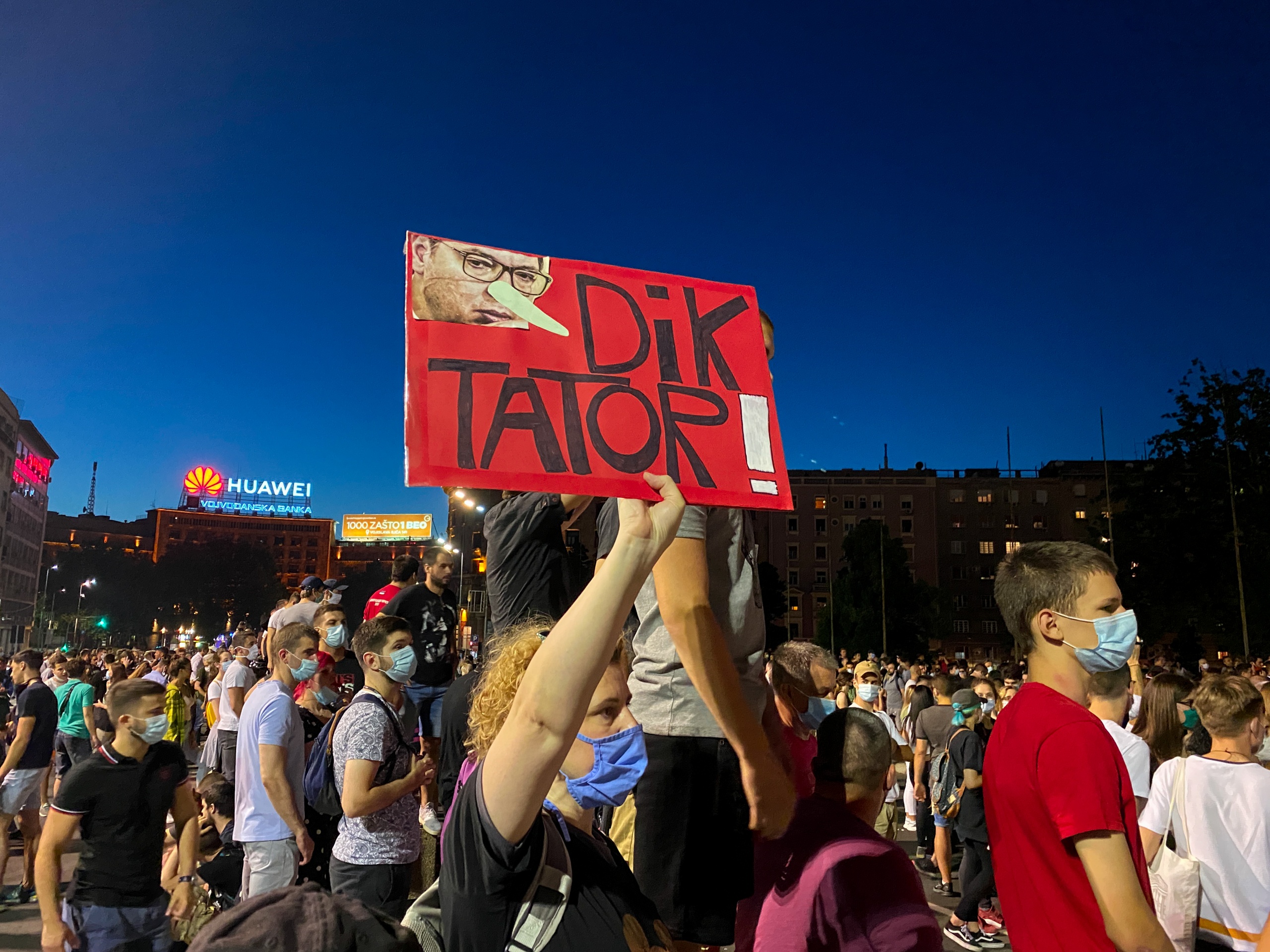Belgrade Besieged: the protests rocking Serbia’s capital5 min read
If you look for the ‘Siege of Belgrade’ in history, the list will start with the Ottomans and usually end with the Nazis. However, despite all the blessings of modern technology, reports on the ongoing protests in Belgrade and Serbia are rather scarce. With very few exceptions of critical reporting, Western (being the synonym for global) media have seldom informed the public about what exactly is happening here.
Well, we cannot blame them too much given that our own national broadcast service, Radio Television of Serbia (RTS), was, in the night when the city was engulfed in protests and police brutality, playing a Jackie Chan movie. Footage of RTS’ director watching the protests on a competitor’s channel went viral. It seemed to sum up the total black-out Serbia has been in for almost a decade, or more precisely since 2012, when the ruling Serbian Progressive Party (SNS) came to power. Back then Prime Minister Aleksandar Vučić assumed total power over the government, a privilege which he brought with him when he assumed the role of President in 2017.
Thus, the true cause of these riots – frustration with authoritarianism – has been misrepresented as a frustrated group of covidiots protesting lockdown.
The announcement of the lockdown did indeed spark the riots, but it is far from being the only reason why we are protesting. At the beginning of June, preparing for the elections taking place on 21 June, the president and his team of medical experts announced victory over the virus, completely lifting imposed bans. People had their doubts, especially given possible evidence of a COVID cover-up, but most went on with their lives as usual, hoping that authorities wouldn’t gamble with our biological lives the same way they had with our social and economic welfare.
Of course, we were wrong.
Prior to the elections, a match between the two main national football teams had been approved as a risk-free event, gathering around 20,000 fans and hooligans, as a sort of a public demonstration of the virus’ defeat. After prom nights, crowded malls, weddings and so on, all of which coincided with an excessive election campaign resulting in a landslide victory for Vučić and his Serbian Progressive Party, the president and his followers threw a celebration followed by trumpeters – not wearing masks – dancing, singing. Cases started to surge to the point that they couldn’t be hidden. Our medical system started to collapse before our eyes, and just a few days after the election, the president’s claims of victory were forgotten.
Vučić addressed the public in his typical manner: he blamed us for everything and said, without proof, that no one had been infected as a result of voting. And so the protests began on July 7th spontaneously – in a heartbeat. Not because of the second lockdown, but because of the government’s constant abuse of us as citizens and human beings. As soon as protests took over the streets of Belgrade, our pandemic crisis response team (accused by many of being politically compromised) declared that all gatherings greater than 10 people would be prohibited, while saying that the match organized before the protests and with 20,000 spectators was risk-free as tickets were sold online.
Scenes of police violence against protestors and journalists swept the city. Thousands of special units, countless canisters of teargas, and – for the first time in decades – horses and dogs were used against demonstrators. They called us terrorists, even as footage of police violence circulated around the country.
Amid the protests, the president found himself en route to Paris to meet his French counterpart for a virtual summit with representatives of Kosovo and Angela Merkel. While some minor individual EU representatives have condemned the violence of Vučić’s regime, no reaction came from either Macron or Merkel. Indeed, it would be rather hypocritical of Macron to address police brutality in another country while the issue remains an open wound in France. And Merkel is in fact considered to be a passive supporter of Vučić, and has been known to turn a blind eye to whatever he does as long as Germany gets its say over Kosovo.
Prior to the start of the protests, Brussels had taken the small, indirect step of challenging Vučić by not allowing Serbia to open a single chapter in the EU membership negotiation process. However, any direct condemnation that would demonstrate that we are not alone in this fight and that there is some solidarity is still missing. We are estranged from our European family, both by our own leaders and the EU.
Speaking about the protests, President Vučić has said, to paraphrase, that no authorities before him had allowed such freedom to protesters as he had in the last 8 years. And there is some truth to it. No authorities since Milošević had restricted freedoms to this extent, leaving us with the only remaining freedom – the freedom to protest. As the protests wind down, we are left with the hope that we are able at least to shake the system up. The siege of Belgrade, however, continues indefinitely.
The images in this piece are by Ognjen Šuvakov.







